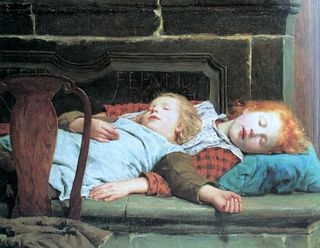Sleep
How Much Sleep Does Your Child Need?
Pediatric sleep panel publishes guidelines for children’s sleep
Posted June 16, 2016

It has become evident that many children are not getting sufficient amounts of quality sleep and the consequences are troubling. But how much sleep should children be getting? Children have individual differences in sleep needs, but few guidelines have been available up to now.
The American Academy of Sleep Medicine (AASM), the largest professional organization of sleep specialists in the U.S., has just published recommendations prepared by a panel of experts.
Those recommendations are:
Infants four to 12 months should sleep 12 to 16 hours per 24 hours (including naps) on a regular basis to promote optimal health.
Children one to two years of age should sleep 11 to 14 hours per 24 hours (including naps) on a regular basis to promote optimal health.
Children three to five years of age should sleep 10 to 13 hours per 24 hours (including naps) on a regular basis to promote optimal health.
Children six to 12 years of age should sleep nine to 12 hours per 24 hours on a regular basis to promote optimal health.
Teenagers 13 to 18 years of age should sleep eight to 10 hours per 24 hours on a regular basis to promote optimal health.
The AASM consensus statement is published in the June 2016 issue of the Journal of Clinical Sleep Medicine and was discussed at the SLEEP 2016 conference in Denver, Colorado.
The recommendations were prepared over a period of 10 months in a project conducted by a Pediatric Consensus Panel of 13 of the nation’s foremost sleep experts, and are endorsed by the American Academy of Pediatrics, the Sleep Research Society, and the American Association of Sleep Technologists. The panel reviewed 864 published scientific articles addressing the relationship between sleep duration and health in children, evaluated the evidence using a formal grading system, and arrived at the final recommendations after multiple rounds of voting.
The Pediatric Consensus Panel found that sleeping the number of recommended hours on a regular basis is associated with overall better health outcomes including: improved attention, behavior, learning, memory, emotional regulation, quality of life, and mental and physical health.
The panel found that sleeping fewer than the recommended hours is associated with attention, behavior, and learning problems. Insufficient sleep also increases the risk of accidents, injuries, hypertension, obesity, diabetes, and depression. The panel also found that insufficient sleep in teenagers is associated with increased risk of self-harm, suicidal thoughts, and suicide attempts.
Additionally, the panel found that regularly sleeping more than the recommended hours may be associated with adverse health outcomes such as hypertension, diabetes, obesity, and mental health problems.
Paruthi S, Brooks LJ, D'Ambrosio C, Hall WA, Kotagal S, Lloyd RM, Malow BA, Maski K, Nichols C, Quan SF, Rosen CL, Troester MM, Wise MS. Recommended amount of sleep for pediatric populations: a consensus statement of the American Academy of Sleep Medicine. J Clinical Sleep Medicine 2016;12(6):785–786.
Photo: Albert Anker - "Von Anker bis Zünd, Die Kunst im jungen Bundesstaat 1848 - 1900", Kunsthaus Zürich


